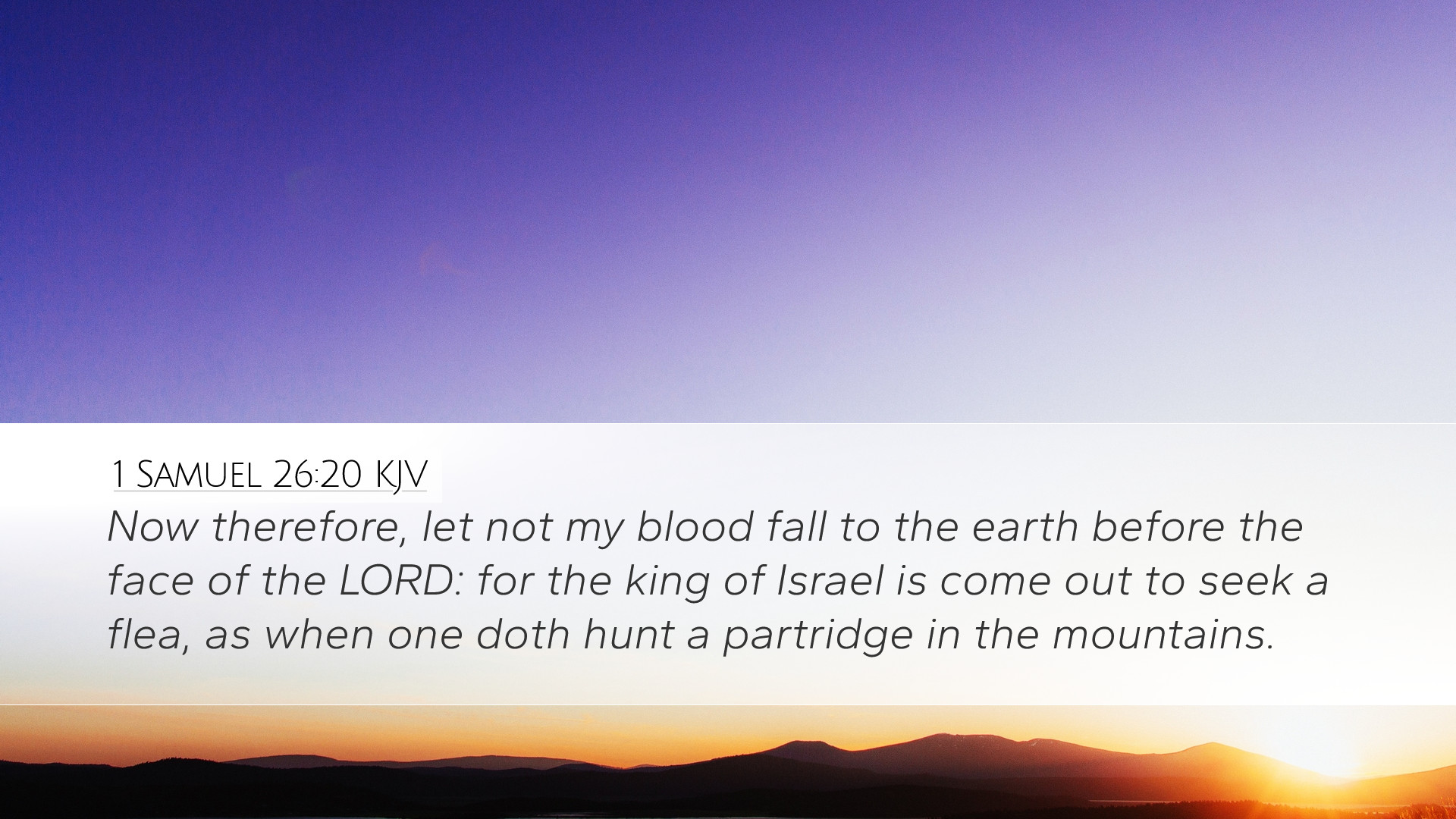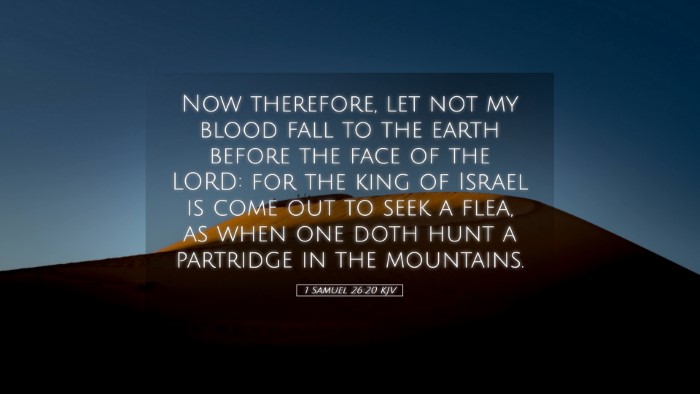Bible Commentary on 1 Samuel 26:20
Verse Reference: 1 Samuel 26:20 - "Now therefore, let not my blood fall to the earth before the face of the Lord: for the king of Israel is come out to seek a flea, as when one doth hunt a partridge in the mountains."
Contextual Overview
This verse occurs in the narrative of David's fugitive years when he was being relentlessly pursued by King Saul. David’s plea highlights the absurdity of Saul's pursuit, illustrating the disproportion between the threat posed by David and the outlandish efforts Saul exerted to eliminate him. This scenario emphasizes the themes of divine justice and grace as well as the contrasting behaviors of kings in Israel.
Commentary Summary
Matthew Henry's Commentary
Matthew Henry interprets this verse through the lens of God’s providence and the futility of Saul's actions. He emphasizes that Saul's pursuit of David, who he likens to a mere flea, reflects the misguided priorities of powerful leaders. Henry notes that David's humility in comparing himself to a partridge, rather than a formidable foe, showcases a deep understanding of his own status before God and the king. This self-awareness highlights David's faith and trust in God's protection amidst immense danger.
Albert Barnes' Notes on the Bible
Albert Barnes elaborates further on the metaphor of hunting a flea as reflective of Saul's excessive zeal. He points out that David, although he had drawn Saul's ire, represented no significant threat worthy of a king's full military attention. Barnes offers insight into David's rhetorical style; by diminishing his own worth and inflating the ridiculousness of the chase, he simultaneously promotes the notion that Saul is wasting not only his resources but his royal dignity. Furthermore, Barnes emphasizes the spiritual significance of asking not to let his blood fall unnoticed, connecting it to the sacredness of life and the divine judgment that accompanies the shedding of innocent blood.
Adam Clarke's Commentary
Adam Clarke provides an exegesis that underlines the idea of divine oversight in the conflicts between David and Saul. Clarke accentuates that David's reference to his blood and life being precious before God reflects a broader theological theme—God's sovereignty over life and death. Clarke also considers the dynamics of authority, explaining that Saul’s pursuit, painted as unreasonably obsessed, serves as a cautionary tale about the corrupting nature of power. He prompts readers to witness the contrast between David's righteousness and Saul’s perilous jealousy, urging a faithful response that trusts in God’s timing and moral order.
Theological Implications
This verse raises important issues concerning leadership, justice, and the nature of divine providence. Through David's appeal, we see a powerful snapshot of vulnerability yet remarkable faith; it emphasizes the notion that God protects His chosen, even when human institutions fail to recognize intrinsic value in individuals. Theological discussions surrounding this verse can also delve into:
- The nature of divine protection: Reflecting on how God safeguards those He has chosen, contrasting with human perspectives of worth and threat.
- The principles of just leadership: The absurdity of misusing power against the defenseless as an indictment of authority that loses sight of ethical governance.
- Humility in adversity: The necessity of humility and reliance on divine intervention when faced with persecution or injustice.
Practical Applications
The insights from this scripture provide rich ground for practical teachings:
- Encouragement in Personal Trials: Believers can draw strength from David's situation, understanding that divine oversight is present even in the worst of circumstances.
- Reflection on Authority: Leaders can be prompted to evaluate their pursuits and decisions, ensuring that they embody justice and humility.
- Faith Over Fear: This verse serves as a reminder to maintain faith in God's plan when seeming inequities arise in personal life or societal structures.
Conclusion
1 Samuel 26:20 serves as a vital reminder of the complexities of human relationships, the nature of God's providence, and the importance of humility before God and others. Through the perspectives offered by the commentaries of Matthew Henry, Albert Barnes, and Adam Clarke, one derives profound insights that challenge and inspire both personal faith and corporate ethics in spiritual leadership.


